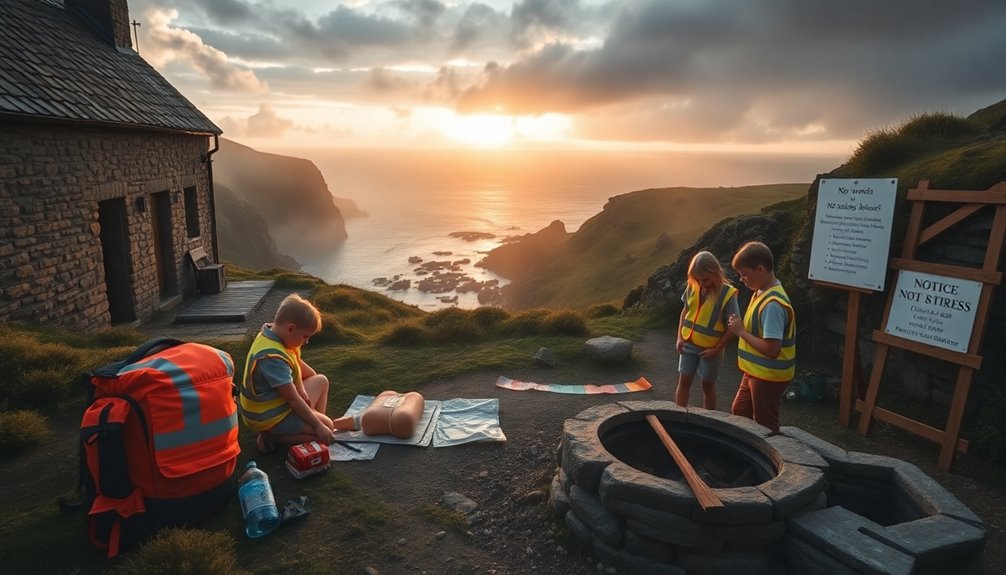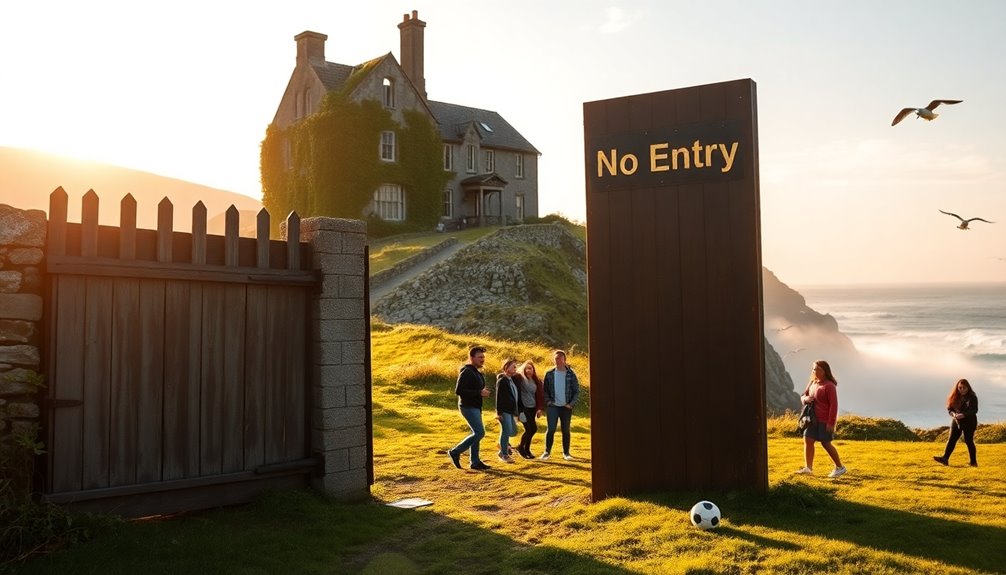
You’ll find that Ireland’s summer English camps began in the late 19th century amid urban reform and rural migration. They were often tightly controlled with strict dress codes, gender separation and curfews, so you’d feel both sheltered and restrained. Cities like Dublin, Cork, Galway, Limerick and Belfast shaped teaching styles and community links. Housing moved from family boarding to modern dorms, and camps slowly opened to work, arts and sports. Keep going to uncover the full transformation.
Historical Roots of Summer English Programs in Irish Cities
Although you might think summer English camps are a recent phenomenon, their roots in Irish cities stretch back to the late 19th and early 20th centuries, when urban schools, religious institutions, and philanthropic groups began offering seasonal classes and activities to improve literacy and English proficiency among rural migrants and immigrant children. You’ll see the historical significance in how these programs opened public spaces for learning and mobility, letting young people claim new opportunities. You’re invited to trace city streets where classrooms doubled as social hubs, fostering practical skills and a sense of autonomy. These camps also enabled cultural exchange, giving participants chances to share folk traditions while adopting new tongues. You’ll appreciate how these origins quietly shaped choices for future generations.
Early Restrictions and Cultural Tensions Affecting Students
While summer English camps promised new opportunities, they were often governed by strict rules that reflected wider cultural tensions, and you’d quickly notice how dress codes, gender separation, and curfews shaped participants’ daily lives. You’d chafe against limitations that felt imposed by authorities trying to preserve cultural identity, even as you wanted to explore new speech and styles. Language barriers heightened that friction: you’d struggle to express dissent or connect across groups, making rules feel more isolating. You’d find yourself maneuvering through coded expectations—what counted as respect, modesty, or acceptable behavior—while craving autonomy. That tension made camps sites of quiet resistance, where small acts of self-definition quietly pushed back against controls that tried to freeze personal and linguistic change.
Key Irish Cities That Hosted Early Language Camps
Those restrictions and everyday negotiations didn’t happen in a vacuum; they played out against very different backdrops across Ireland. You’d feel Dublin dynamics in busy streets where teachers slipped new methods into old curricula, while Cork connections fostered more informal networks between local hosts and visiting students. Galway gatherings offered a freer, artsy vibe that encouraged conversation and risk-taking in language practice. Limerick landmarks provided practical meeting points and a sturdy sense of civic identity that made camps feel anchored. Belfast bridges symbolized crossings—literal and social—where divided communities sometimes found common purpose in education. Along the southeast coast, Waterford waves framed small, determined programs that combined coastal calm with spirited instruction, all nudging learners toward greater independence.
Student Housing: From Boarding Houses to Modern Dorms

As camps grew from short summer programs into longer, more organized experiences, student housing evolved too—from family-run boarding houses where you shared meals and stories with hosts, to purpose-built dorms designed for international groups. You’d notice the boarding house evolution in everyday comforts: a private corner at a kitchen table, a host who became a local guide, and rules that felt like gentle traditions rather than constraints. As demand shifted, campuses responded with modern dorm amenities—secure entry, shared common rooms, laundry, and Wi‑Fi—so you can live independently while still connecting. That shift gave you choice: stay immersed with a family for intimacy and language practice, or opt for dorm life that supports autonomy and social freedom among peers.
Transportation Essentials for International Students
Getting around in Ireland will shape a big part of your camp experience, so it helps to know the transport options, costs, and routines before you arrive. public buses, trains and regional coaches connect cities and towns reliably, but schedules can vary by season and route; campus shuttles, bike rentals, and car-sharing are common near larger centers. You’ll want a simple plan: buy a Leap Card or regional pass for public transport to save cash and skip queues. Book airport transfers ahead if you’re arriving late or with gear. Learn peak times, ticket rules, and typical fares so you can move freely. Embrace cycling and rideshares for short trips — they give you independence without tying you down.
Navigating Irish Language Policies and School Regulations
When planning a summer English camp in Ireland, you’ll need to understand Gaeltacht language mandates and how they affect where and when Irish must be used. Check school permission limits for activities, arrivals, and foreign-language instruction so you don’t exceed what administrators allow. Be aware of enforcement mechanisms and possible penalties to guarantee your program stays compliant.
Gaeltacht Language Mandates
If you’re planning an English camp in a Gaeltacht area, you’ll need to understand the legal and educational expectations that protect Irish as the community language. You’ll balance Gaeltacht immersion goals with respect for language preservation, knowing local rules limit English use during official activities. You can still foster freedom by designing elective English sessions outside core community hours and by partnering with local schools and parents.
| Time | Activity | Language focus |
|---|---|---|
| Morning | Games | Irish priority |
| Afternoon | Workshops | Bilingual options |
| Evening | Social | English optional |
Know permit requirements, signage rules, and staff language competencies. Stay transparent with communities, keep sessions voluntary, and prioritize cultural respect while offering learners choice.
School Permission Limits
Having clarified Gaeltacht expectations for camp activities, you’ll next need to address what local schools will allow—many have formal rules about outside programs using their facilities or engaging their pupils, especially regarding language use and supervision. You’ll want to read school policies closely: they often specify hours, staffing ratios, which rooms you can use, and whether English-focused activities conflict with Irish-language commitments. Don’t assume permission; approach principals with a clear plan that shows respect for the school’s culture while asserting your camp’s freedom to teach. Get written parental consent for each child, and be ready to adapt sessions to meet school concerns about language balance or supervision. Clear agreements reduce friction and keep your program running.
Enforcement and Penalties
Because local authorities and schools take Irish-language commitments seriously, you’ll need to understand how enforcement works and what penalties could apply if rules are breached. You want freedom to run a camp, but you’ve got to navigate enforcement measures and penalty structures that aim to protect language policy. Know your rights, document permissions, and prepare mitigation plans so you can contest unfair sanctions.
- Audit readiness: keep records proving Irish-language activities and communications to reduce risk.
- Warning stages: informal notices often precede formal sanctions; respond quickly and transparently.
- Formal penalties: fines, revoked approvals, or operational limits are possible outcomes.
- Appeals: challenge unfair enforcement through appeals and legal review to defend your freedom.
Local Amenities: Food, Banking and Communication for Students

You’ll want to know what food options are within walking distance and whether the camp can accommodate dietary needs. Check where the nearest bank or ATM is and whether students can easily access cards or exchange currency. Also confirm mobile reception, Wi‑Fi availability, and options for staying in touch with family.
Food Options Nearby
When you’re looking for quick meals between classes or a place to hang out with new friends, the area around the camp offers a mix of cafés, sandwich shops, and affordable takeaways within a short walk. You’ll find local eateries serving traditional cuisine and cultural delicacies alongside fast food and snack shops, so you can choose freedom in every bite. Meal planning’s easy with clear food prices posted, and plenty of vegetarian options and labels for dietary restrictions let you eat confidently while exploring. Pick spots that match your pace — lingering cafés for chats or grab-and-go places for wandering. Below are practical choices to help you taste, save, and move as you like:
- Budget takeaways with combo deals and clear prices.
- Cozy cafés offering traditional cuisine and light meals.
- Vegetarian-focused bistros with allergy-friendly menus.
- Snack shops for quick cultural delicacies and treats.
Banking & Communication
If you need to manage money or stay connected during camp, the local area makes it straightforward with nearby banks, ATMs, mobile shops, and reliable café Wi‑Fi. You’ll find flexible banking options for cards and cash, and communication tools like pay-as-you-go SIMs, charging stations, and free hotspots so you can explore without worry. Staff at banks are helpful if you’re opening a basic account, and local shops will top up your data. You can relax knowing you won’t be cut off from home or plans, keeping your independence intact while learning. Below is a quick reference for what to expect:
| Service | Typical Hours | Notes |
|---|---|---|
| Bank branches | 9am–4:30pm | Weekdays only |
| ATMs | 24/7 | Card fees may apply |
| Mobile shops | 9am–6pm | SIMs & top-ups |
| Cafés (Wi‑Fi) | Variable | Often free with purchase |
Health Care and Safety Services for Young Learners

Because young learners are far from home, it’s essential that summer camps have clear, accessible health care and safety systems in place. You should expect transparent health services and firm safety protocols so you can explore freely without constant worry. Camps ought to inform you and guardians about emergency contacts, medical consent, and routine care. They should respect independence while keeping safeguards active.
- On-site first aid and connections to local clinics for quick treatment.
- Trained staff with certifications in child care, CPR, and safeguarding.
- Secure medication handling, clear allergy plans, and dietary accommodations.
- Daily check-ins, incident reporting, and evacuation procedures shared upfront.
Choose camps that balance freedom with accountable, well-communicated safety structures.
Work, Volunteer and Internship Opportunities During Summer Stay
If you’re staying through the summer, you can find paid roles at camps and language schools that fit different skills and schedules. You can also explore volunteer placements with youth groups or community projects to gain experience and cultural insight. Both options can complement short internships and help you build practical skills while practicing English.
Paid Summer Roles
While you’re here for language and culture, a summer stay also opens doors to paid roles—part-time jobs, paid internships, or stipend-supported volunteer projects—that can help cover costs, build CV skills, and deepen your local experience. You’ll find summer job opportunities in hospitality, camp support, or local businesses, and teaching assistant positions at language schools let you share skills while learning the ropes. Choose roles that give autonomy, flexible hours, and real responsibility so you can explore freely between shifts.
- Seasonal hospitality: bartending, front desk, or kitchen roles with tips and social nights.
- Teaching assistant positions: support lessons, lead activities, earn experience.
- Paid internships: admin, marketing, or event roles tied to camps.
- Stipend roles: community projects with modest pay and schedule freedom.
Volunteer Placement Options
Alongside paid roles, many students pick volunteer placements or internships to gain hands-on experience without the pressure of full employment; these options let you contribute to local projects, practice English in real contexts, and build meaningful references. You can choose short-term roles at youth camps, heritage sites, or environmental initiatives that prioritize community engagement and let you set your own pace. Internships often focus on arts, tourism, or education, giving structure without locking you into rigid hours. Cultural exchange happens naturally when you live with locals, join village events, or teach conversational English in relaxed settings. Pick placements that match your values, keep a flexible mindset, and treat every task as a chance to grow your skills and friendships.
Social Life and Extracurriculars: Sports, Arts and Community Events
Community buzz defined much of camp life: you’ll find sports fields alive with pick-up games, art rooms where you can try everything from watercolors to drama workshops, and regular community events that bring everyone together. You’re encouraged to roam between sports activities and artistic expression, choosing how much structure you want while building friendships. Community engagement was more than attendance — it was chance to lead a workshop, organize a match, or stage a mini-festival. You’ll taste local culture and share your own.
- Morning runs and football matches to wake you up and bond fast.
- Open-studio hours for painting, music, and improvisation.
- Evening cultural events showcasing folk music, dance, and stories.
- Volunteer-led projects that connect camp with the nearby village.
Cost of Living and Budgeting Tips for Short-Term Students
After enjoying sports, art sessions, and village events, you’ll also want to get a handle on daily costs so your stay doesn’t strain your wallet. Do a simple cost analysis before you leave: estimate accommodation, meals, transport, and pocket money. Choose flexible options—shared rooms, cook-friendly stays, and passes for local buses—to cut rates without losing freedom. Use budgeting strategies like daily spending limits, cash envelopes, and a quick app to track purchases. Prioritize experiences that matter to you and skip impulse buys. Keep an emergency buffer equal to a few days’ expenses. Watch local markets for cheap meals and free cultural events for rich experiences. With foresight and smart choices, you can roam freely without financial stress.
Evolving Reputation: From “Forbidden” to Welcoming Programs

Though once frowned upon by some locals and officials, Irish summer English camps have steadily shed that stigma and become embraced as cultural and economic assets. You’ll notice how cultural shifts and program expansion changed perceptions: communities now see camps as gateways, not threats. You can join a scene where language learning mixes with local traditions, and you’ll feel freer exploring options.
- Local engagement — towns partner with organizers, sharing heritage and resources.
- Regulatory clarity — clearer rules made camps legitimate and safer for you.
- Diverse offerings — program expansion means tailored courses for varied ages and interests.
- Economic boost — camps support small businesses, creating space for independent choices.
You’re part of a welcoming, evolving movement that values openness and autonomy.
Some Questions Answered
Were Any Notable Literary Figures Connected to These Early Summer Camps?
Yes — you’ll find notable literary influences tied to camp literature; rebellious poets and novelists subtly shaped curricula and storytelling, so the camps doubled as creative havens where free-thinking writers left marks on language, lore, and pedagogy.
Did Religious Institutions Ever Sponsor or Oppose the Camps?
Yes — you’ll find both religious sponsorship and institutional opposition: churches sometimes backed camps for moral education, while other institutions opposed them as social unrest or secular influence, so you’ll navigate tension while seeking personal freedom.
How Did Local Irish Dialects Influence Teaching Materials?
Local Irish dialect variations shaped teaching methodologies you used, so materials adapted vocabulary, idioms and pronunciation exercises to respect local speech. You’d get flexible lessons encouraging expression, choice, and linguistic freedom within structured pedagogy.
Were Any Camps Subject to Espionage or Political Surveillance?
Yes — once a teacher joked about a mole in a dorm, and spy networks quietly logged visitors; political tensions made camps wary, so you’d guard lessons and friendships like contraband, craving the freedom to teach and learn openly.
What Role Did Private Tutors Play Alongside Formal Programs?
Private tutors supplemented formal programs, mixing tailored tutoring methods with informal conversation practice; you’ll get personalized pacing and cultural nuance, boosting educational impact and preserving autonomy, so learners choose focus, tempo, and the freedoms they value most.
